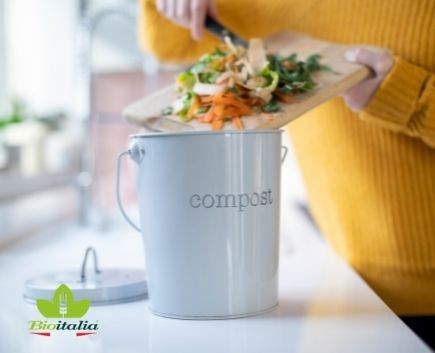
Food Waste: Causes and Solutions
We don't always realize how important it is to bring a plate of pasta to the table every day or to eat exactly the food we desire. The abundant Sunday lunch, the ritual of homemade dessert, organic beverages, and overseas products, all fortunes to which we are now accustomed and often take for granted. But have we ever wondered where all the food we don't consume ends up? Have we ever truly thought about where the leftovers we throw away end up, and especially what impact they have on the earth that hosts us? Over the years, food waste has become a real plague for society. It's hard to think that today, in an era when all the food in the world is at our fingertips and we no longer have to respect the seasonality of fruits and vegetables, food waste has become the real big problem. Every year, all the amount of wasted food involves important natural resources such as water, fertilizers, and soil. Food waste has now increased by 50% compared to previous years, an important percentage when you think about how many foods could instead meet the population's needs, which is why food waste was widely discussed in Italy in 2020.
Food Waste Awareness Day: Sensitization
Certainly, considering that today about 2 billion people are overweight, it's hard to think about food waste in the world, especially when referring to the scarcity of food on earth. Reducing food loss and ensuring reduced consumption of raw materials allows the world to use the fortunes that surround us in the right way. That's why over the years specific policies have become indispensable: one of them being the law of August 19, 2016, which adopts important measures regarding the distribution of food and pharmaceutical products to stimulate social solidarity and limit waste. This law aims to reduce waste production and promote reuse, contributing to the achievement of the general objectives of the national prevention program. With this law, the aim is to promote the recovery and donation of food products, targeting both public and private sectors. The law against food waste involves combating waste starting from 2014. On February 5th, public opinion is sensitized on the issue of food. The fight against food waste has represented a real objective for humanity; in fact, by 2030, the goal is to halve global consumption. But why do we waste so much food?
Food Waste: Some Causes
Today, the market imposes aesthetic standards on us that contribute to the maceration of food products even before they are put on the market and long before they end up on the shelves. Paradoxical when you think about the staggering numbers that remind us every day of hunger in the world. It's important to calculate how much food is wasted, but it's necessary to consider instead how many foods do not reach our homes because they are thrown away immediately after harvesting. There is a list that highlights the five most wasted foods, which over the years seems to remain almost unchanged:
- Fresh fruit;
- Salads;
- Fresh bread;
- Various types of vegetables;
- Onions, garlic, and tubers.
Food waste in the world also depends a lot on unsold products and purchases made by consumers that do not end up on the table because they are left to expire in the fridge and pantry. If attention were paid to how much food we waste, many more people could be fed.
Food Waste: Some Solutions
Over the years, true anti-waste theories have emerged, and today, the majority of families implement a specific strategy. People buy long-life food and frequently purchase fresh products or small sizes; many instead eat perishable food first, carefully evaluating the necessary quantities before cooking or simply preserving the leftovers. There is no reason why we shouldn't start consuming the food we have available correctly while remaining sensitive to the planet that hosts us and the people around us. That's why it's necessary to raise awareness among consumers to recover the value of nutrition. We could start with organic foods, which mostly reduce the impact that cultivation has on the environment. Organic products prioritize food quality and respect for those who consume it; that's why pesticides and chemical fertilizers are avoided, intensive cultivation is eliminated, and investments are made primarily in our health and that of future generations. Food waste in Italy has a significant impact on the environment with the consumption and use of natural resources; that's why it's necessary to prefer products that prioritize the Earth. Choosing organic foods represents a turning point in this case. Food productions from supply chains significantly contribute by reducing food loss and avoiding negative repercussions that impact social, economic, and environmental levels. Supply chains reduce the excessive use of food; just think that food systems are the main causes of climate change, loss of biodiversity, water reduction, and land degradation, all issues that organic productions prioritize. In this regard, organic food uses sustainable tools and projects aimed at bio-protection, attention to the microsystems and microorganisms that inhabit the earth. The natural substances used by organic supply chains allow the creation of highly sustainable food systems. For this reason, organic food reduces losses throughout the entire production and supply chain. There have been many attempts to fight food waste over the years. Apps against food waste have been developed to involve the more technological; sensitization in schools about food waste for children; techniques against food waste in agriculture, and suggesting a thousand ways to reduce waste from the field to the table. The fight against improper food use has stimulated the creation of specific plans to prevent waste. Entire guides allow consumers to give new life to leftovers: recipes on how to recycle stale biscuits, suggestions on how to best reuse leftover sauces, and how to store beverages long-term after opening. The 10 rules to avoid food waste have been established, and specific initiatives and events have been launched to keep the focus on waste alive.
But the perfect solution to all this consumption starts with us, from our daily choices and the desire to make a significant contribution while keeping high attention not only towards the Earth but also respecting its inhabitants.






